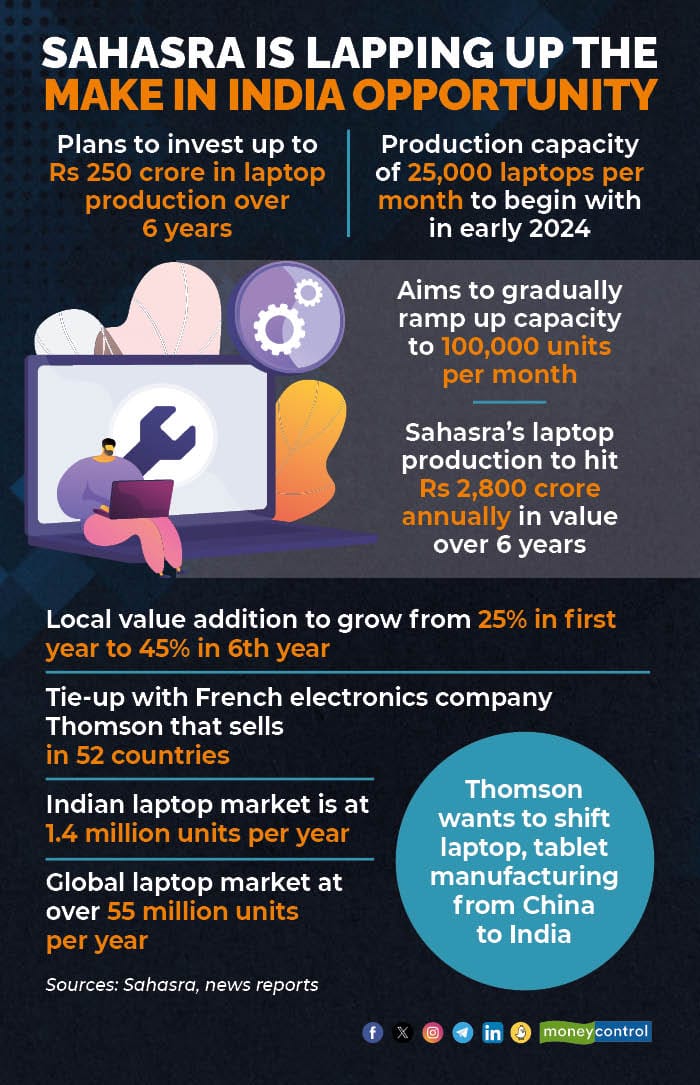



The homegrown Sahasra Electronics, which recently started making semiconductors, is now planning to invest up to Rs 250 crore over the next six years in laptop production.
While the Delhi-headquartered company is starting with an initial capacity of 25,000 laptops a month under the production-linked incentive (PLI) scheme for IT hardware, chief executive officer Varun Manwani said that plans are to gradually raise the capacity to 1,00,000 a month.
According to the plan that Sahasra has submitted to the government for incentives, turnover at its laptop production division could touch Rs 2,800 crore in six years.
The company has already received its first order for a batch of 10,000 laptops from French electronics brand Thomson Computing, which is expected to be delivered in January 2024.
As is the case with many electronics companies in the West, the French electronics company intends to gradually reduce its supply chain dependence on China, where its production is currently concentrated. Thomson is not only looking to shift the production of its laptops and tablets from China to India, it is also planning a bet on the country’s fast-growing electronics market.
According to Manwani, the government’s policy adjustments in the last few months to introduce a licence for importing laptops have created an opportunity for new players to hit the domestic market quickly with locally manufactured products.
“It is true that a few laptop brands like Dell, Lenovo, Asus and others currently control a large part of the market. But the new policy conditions have created a level playing field for everyone to a large extent which allows new players to seize some market share,” said Manwani.
According to industry estimates, the domestic market currently requires 13-14 million laptops annually, of which about 80 percent are imported. While laptop shipments have been seen to be slowing down in the last few quarters owing to high inventory levels and a short-term demand slowdown, India’s growing pace of digitisation and expansion of the services sector are expected to fuel demand in the long term.

One of the biggest criticisms of the government’s incentive schemes for electronics is that they are not leading to enough local value addition to cover their costs. For example, former Reserve Bank of India governor Raghuram Rajan has posited that the PLI scheme for smartphones gives out more money in handouts to companies than the domestic value addition that happens in assembling the devices.
However, those concerns might be laid to rest in the next few years if local value addition is able to outstrip the PLI handouts. And that’s exactly what Sahasra plans to achieve in the next few years, although it is starting out by domestically assembling kits of laptop components sourced from China.
In its application submitted to the government, Sahasra has said that local value addition in laptops could grow from 25 percent in the first year of production to around 45 percent by the sixth year. For context, the laptops that Sahasra is set to manufacture for Thomson will be in a spectrum of low-cost to premium — from sub-Rs 15,000 per unit to over Rs 90,000 per unit.
“When you talk about the laptop, you're not only talking about the bare unit itself. You also talk about accessories like power supply. Many battery plants are coming up in India. With so many new projects happening in semiconductors, it’s possible that somebody will come up with an LCD display plant or a motherboard manufacturing plant,” said Manwani.
“At the same time, in years three, four and five, when our semicon plant starts to package chips which get used in SSDs, which are the higher-end chips, our domestic value addition will be one of the highest,” he added.
The Rs 17,000-crore PLI scheme for IT hardware gives extra incentives to manufacturers for domestic procurement of components, rather than depending on imports.
“If a company takes all those incentives, it can go up to 45-50 percent of local value addition. If they also use semiconductors produced locally, the total local value addition for a piece of hardware can go up to 70-75 percent in the next few years,” a senior government official had told Moneycontrol earlier.

Discover the latest Business News, Sensex, and Nifty updates. Obtain Personal Finance insights, tax queries, and expert opinions on Moneycontrol or download the Moneycontrol App to stay updated!
Find the best of Al News in one place, specially curated for you every weekend.
Stay on top of the latest tech trends and biggest startup news.